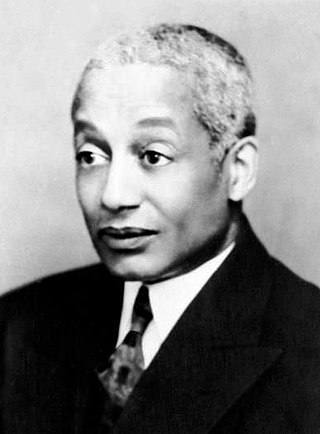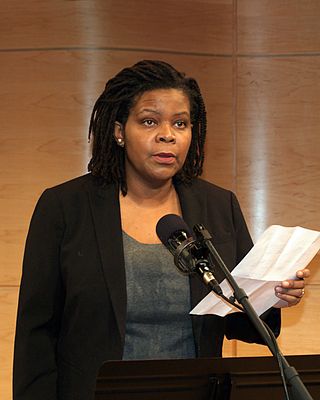
Charles Margrave Taylor is a Canadian philosopher from Montreal, Quebec, and professor emeritus at McGill University best known for his contributions to political philosophy, the philosophy of social science, the history of philosophy, and intellectual history. His work has earned him the Kyoto Prize, the Templeton Prize, the Berggruen Prize for Philosophy, and the John W. Kluge Prize.
William Julius Wilson is an American sociologist, a professor at Harvard University, and an author of works on urban sociology, race, and class issues. Laureate of the National Medal of Science, he served as the 80th President of the American Sociological Association, was a member of numerous national boards and commissions. He identified the importance of neighborhood effects and demonstrated how limited employment opportunities and weakened institutional resources exacerbated poverty within American inner-city neighborhoods.

Kwame Akroma-Ampim Kusi Anthony Appiah is an English-American philosopher and writer who has written about political philosophy, ethics, the philosophy of language and mind, and African intellectual history. Appiah is Professor of Philosophy and Law at New York University, where he joined the faculty in 2014. He was previously the Laurance S. Rockefeller University Professor of Philosophy at Princeton University. Appiah was elected President of the American Academy of Arts and Letters in January 2022.
African philosophy is the philosophical discourse produced using indigenous African thought systems. African philosophers are found in the various academic fields of present philosophy, such as metaphysics, epistemology, moral philosophy, and political philosophy. It discusses substantive issues from an African perspective.
Lewis Ricardo Gordon is an American philosopher at the University of Connecticut who works in the areas of Africana philosophy, existentialism, phenomenology, social and political theory, postcolonial thought, theories of race and racism, philosophies of liberation, aesthetics, philosophy of education, and philosophy of religion. He has written particularly extensively on Africana and black existentialism, postcolonial phenomenology, race and racism, and on the works and thought of W. E. B. Du Bois and Frantz Fanon. His most recent book is titled: Fear of Black Consciousness.
Charles Wade Mills was a Jamaican philosopher who was a professor at Graduate Center, CUNY, and Northwestern University. Born in London, Mills grew up in Jamaica and later became a United States citizen. He was educated at the University of the West Indies and the University of Toronto.

Ralph Barton Perry was an American philosopher. He was a strident moral idealist who stated in 1909 that, to him, idealism meant "to interpret life consistently with ethical, scientific, and metaphysical truth." Perry's viewpoints on religion stressed the notion that religious thinking possessed legitimacy should it exist within a framework accepting of human reason and social progress.
Jonathan Lear is an American philosopher and psychoanalyst. He is the John U. Nef Distinguished Service Professor in the Committee on Social Thought at the University of Chicago and served as the Roman Family Director of the Neubauer Collegium for Culture and Society from 2014 to 2022.
Irwin Edman was an American philosopher and professor of philosophy.
Emmanuel Chukwudi Eze was a Nigerian philosopher. Eze was a specialist in postcolonial philosophy. He wrote as well as edited influential postcolonial histories of philosophy in Africa, Europe, and the Americas. He brought Immanuel Kant's racism to light among Western thinkers in the 1990s, an area of Kant's life that Western philosophers often gloss over. Influences in his own work include Paulin Hountondji, Richard Rorty, David Hume, and Immanuel Kant.

Alain LeRoy Locke was an American writer, philosopher, and educator. Distinguished in 1907 as the first African American Rhodes Scholar, Locke became known as the philosophical architect—the acknowledged "Dean"—of the Harlem Renaissance. He is frequently included in listings of influential African Americans. On March 19, 1968, the Rev. Dr. Martin Luther King Jr. proclaimed: "We're going to let our children know that the only philosophers that lived were not Plato and Aristotle, but W. E. B. Du Bois and Alain Locke came through the universe."
Rogers Garland Albritton was an American philosopher who served as chair of the Harvard and UCLA philosophy departments. He published little and inspired the entry "albritton" - a contraction of "all but written" - in the Philosophical Lexicon begun by Daniel Dennett. Albritton's specialties included ancient philosophy, philosophy of mind, free will, skepticism, metaphysics and the work of Ludwig Wittgenstein.
Black existentialism or Africana critical theory is a school of thought that "critiques domination and affirms the empowerment of Black people in the world". Although it shares a word with existentialism and that philosophy's concerns with existence and meaning in life, Black existentialism is "is predicated on the liberation of all Black people in the world from oppression". Black existentialism may also be seen as method, which allows one to read works by African-American writers such as W. E. B. Du Bois, James Baldwin, and Ralph Ellison in an existentialist frame. As well as the work of Civil Rights Activists such as Malcolm X and Cornel West. Lewis Gordon argues that Black existentialism is not only existential philosophy produced by Black philosophers but is also thought that addresses the intersection of problems of existence in black contexts.
Africana philosophy is the work of philosophers of African descent and others whose work deals with the subject matter of the African diaspora. The name does not refer to a particular philosophy, philosophical system, method, or tradition. Rather, Africana philosophy is a third-order, metaphilosophical, umbrella-concept used to bring organizing oversight to various efforts of philosophizing. Africana philosophy is a part of and developed within the field of Africana studies.

Anita LaFrance Allen is the Henry R. Silverman Professor of Law and professor of philosophy at the University of Pennsylvania Law School. She was formerly Vice Provost for Faculty from 2013 to 2020.

Annette Gordon-Reed is an American historian and law professor. She is currently the Carl M. Loeb University Professor at Harvard University and a professor of history in the university's Faculty of Arts & Sciences. She is formerly the Charles Warren Professor of American Legal History at Harvard University and the Carol K. Pforzheimer Professor at the Radcliffe Institute for Advanced Study. Gordon-Reed is noted for changing scholarship on Thomas Jefferson regarding his relationship with Sally Hemings and her children.
Peter Eli Gordon is an American historian of philosophy, a critical theorist, and intellectual historian. The Amabel B. James Professor of History and Faculty Affiliate in the Department of Philosophy at Harvard University, Gordon focuses on continental philosophy and modern German and French thought, with particular emphasis on the German philosophers Theodor Adorno and Martin Heidegger, critical theory, continental philosophy during the interwar crisis, and most recently, secularization and social thought in the 20th century.
Paul Christopher Taylor is an American philosopher, author, and was W. Alton Jones Professor of Philosophy at Vanderbilt University until moving to UCLA in the summer of 2023. Previously he taught philosophy and African American studies at Pennsylvania State University. He writes on race theory, aesthetics, pragmatism, social and political philosophy, and Africana philosophy.

Marcia Chatelain is an American academic who serves as the Penn Presidential Compact Professor of Africana Studies at the University of Pennsylvania. In 2021, she was awarded the Pulitzer Prize for History for her book Franchise: The Golden Arches in Black America (2020), for which she also won the James Beard Award for Writing in 2022. Chatelain was the first black woman to win the latter award.
Erin I. Kelly is an American philosopher and author. She is a professor of philosophy at Tufts University.







